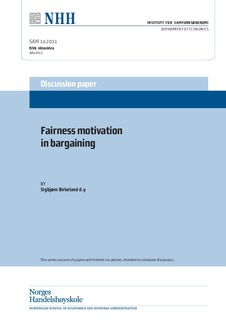| dc.contributor.author | Birkeland, Sigbjørn | |
| dc.date.accessioned | 2012-03-13T12:05:39Z | |
| dc.date.available | 2012-03-13T12:05:39Z | |
| dc.date.issued | 2011-07 | |
| dc.identifier.issn | 0804-6824 | |
| dc.identifier.uri | http://hdl.handle.net/11250/163370 | |
| dc.description.abstract | In this paper, we develop a model that captures the potential conflict
between two individuals who follow different fairness principles in bargaining.
This model is used to analyse the infl
uence of fairness motivation
on the possibility of reaching an agreement in bargaining, and to examine
the properties of the agreement. We show that bargaining between two
individuals who are strongly fairness motivated, but who disagree about
what represents a fair division, ends in disagreement. This result contrasts
the standard bargaining model with individuals who are only motivated by
material self-interest, which always leads to agreement. Furthermore, by
applying the Nash bargaining solution, we study the influence
of fairness
motivation on the bargaining outcome. A fairness motivated individual
reaches an outcome that is closer to his fairness principle in bargaining
against an individual who is only motivated by material self-interest. | no_NO |
| dc.language.iso | eng | no_NO |
| dc.publisher | Norwegian School of Economics, Department of Economics | no_NO |
| dc.relation.ispartofseries | Discussion Papers;14/2011 | |
| dc.title | Fairness motivation in bargaining | no_NO |
| dc.type | Working paper | no_NO |
| dc.subject.nsi | VDP::Social science: 200::Economics: 210::Economics: 212 | no_NO |
